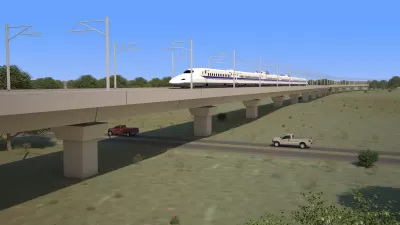Christian McPhate and Ashlea Sigman provide a thorough and insightful read about the environmental impacts of Texas' water management policies, especially along the Brazos River, a drought-stricken water supply that cuts across the state.
"The state’s water development board says two-thirds of the state is now grappling with severe to moderate drought, and statewide reservoir storage is the lowest it’s been since 1990," explain McPhate and Sigman in describing the larger context for the article's discussion of the state's water policy controversies.
"As the drought drags on, labyrinthine laws that allocate increasingly scarce water supplies in Texas are setting farmers against manufacturers, community against community, and state agency against state agency."
As its case study, the article focuses on the example of the Brazos River.
"Today, there’s simply not enough water flowing in the Brazos River to satisfy all the water rights claimed by cities, farmers and industry" and "the river is in a death grip…"
The article starts with a poetic nod to Goodbye to a River by John Graves, and goes on to discuss such critical policy issues as the state's "prior appropriations system," which prompted a 2012 lawsuit involving Dow Chemical (in November 2012, the plant’s daily water consumption of 155 million gallons a day far exceeded the 143 million gallons of water used daily by the 1.3 million residents of Dallas).
Following on that expansive coverage, the Dallas News recently published an editorial calling for reform of the "prior appropriations system." According to the editors of the paper, "it makes little sense for Texas to perpetuate an antiquated “prior appropriations system” that guarantees priority downstream water rights to riverside industries based on seniority." The editorial cites research from the Denton Record-Chronicle and graduate journalism students at the University of North Texas to make the case against the same Dow Chemical example examined by McPhate and Sigman.
FULL STORY: Battling over the Brazos

Trump Administration Could Effectively End Housing Voucher Program
Federal officials are eyeing major cuts to the Section 8 program that helps millions of low-income households pay rent.

Planetizen Federal Action Tracker
A weekly monitor of how Trump’s orders and actions are impacting planners and planning in America.

Ken Jennings Launches Transit Web Series
The Jeopardy champ wants you to ride public transit.

Crime Continues to Drop on Philly, San Francisco Transit Systems
SEPTA and BART both saw significant declines in violent crime in the first quarter of 2025.

How South LA Green Spaces Power Community Health and Hope
Green spaces like South L.A. Wetlands Park are helping South Los Angeles residents promote healthy lifestyles, build community, and advocate for improvements that reflect local needs in historically underserved neighborhoods.

Sacramento Plans ‘Quick-Build’ Road Safety Projects
The city wants to accelerate small-scale safety improvements that use low-cost equipment to make an impact at dangerous intersections.
Urban Design for Planners 1: Software Tools
This six-course series explores essential urban design concepts using open source software and equips planners with the tools they need to participate fully in the urban design process.
Planning for Universal Design
Learn the tools for implementing Universal Design in planning regulations.
Heyer Gruel & Associates PA
Ada County Highway District
Institute for Housing and Urban Development Studies (IHS)
City of Grandview
Harvard GSD Executive Education
Toledo-Lucas County Plan Commissions
Salt Lake City
NYU Wagner Graduate School of Public Service





























